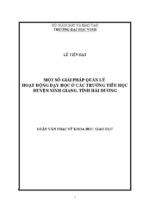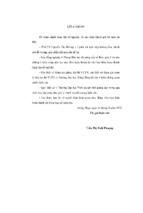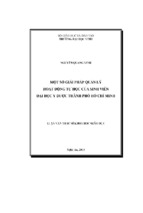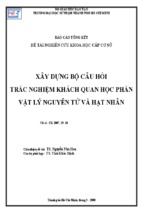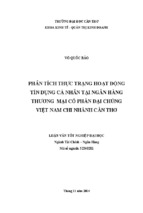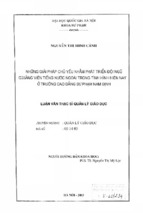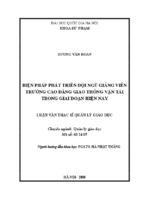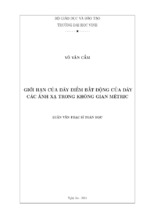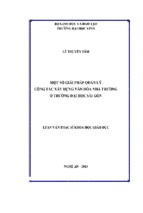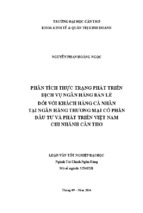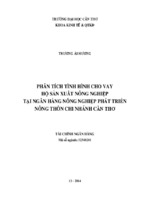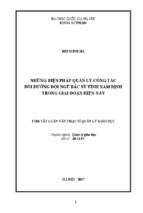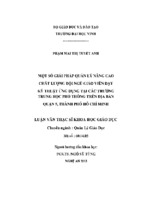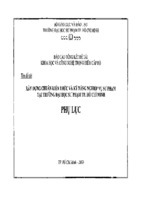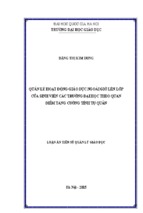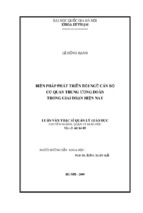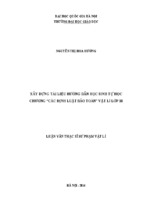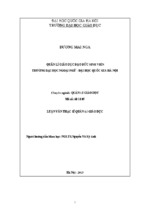VIETNAM NATIONAL UNIVERSITY, HANOI
UNIVERSITY OF LANGUAGES AND INTERNATIONAL STUDIES
FACULTY OF POST-GRADUATE STUDIES
--------
NGUYỄN THỊ MINH HIẾU
STUDENTS’ BELIEFS ABOUT VOCABULARY
LEARNING: A MIXED METHODS STUDY
( Sử dụng phương pháp hỗn hợp nghiên cứu niềm tin của học sinh về việc học
từ vựng)
M.A. MINOR PROGRAMME THESIS
Field: Language Teaching Methodology
Code: 60140111
HANOI, 2014
VIETNAM NATIONAL UNIVERSITY, HANOI
UNIVERSITY OF LANGUAGES AND INTERNATIONAL STUDIES
FACULTY OF POST-GRADUATE STUDIES
--------
NGUYỄN THỊ MINH HIẾU
STUDENTS’ BELIEFS ABOUT VOCABULARY
LEARNING: A MIXED METHODS STUDY
( Sử dụng phương pháp hỗn hợp nghiên cứu niềm tin của học sinh về việc học
từ vựng)
M.A. MINOR PROGRAMME THESIS
Field: Language Teaching Methodology
Code: 60140111
Superisor: Dr. Lê Văn Canh
HANOI, 2014
DECLARATION
I hereby declare that this thesis is my own work and effort and that has not been
submitted anywhere for any award. Where other sources of information have been
used, they have been acknowledged. I cede copyright of the thesis in favor of PostGraduate Department- Vietnam National University.
Ha noi, 2014
Nguyễn Thi ̣Minh Hiế u
i
ACKNOWLEDGEMENTS
First of all, I wish to send my sincere thanks to my supervisor, Dr Lê Văn Canh
for his expert guidance, helpful suggestions and critical feedback throughout the study.
Secondly, I would like to acknowledge my gratitude to all the lectures in the
Faculty of Post-graduate Studies of Hanoi University of Languages and International
Studies for their useful lessons from which I have benefited a lot for the
accomplishment of this study.
And I am also indebted to my students from class 11A1, 11A4, 11A7 and my
colleagues at Ha Long high school for their participation and assistance without which
this study could not have been successful.
Last but not least, I would like to express my special thanks to my family, my
beloved parents, my younger brother and my dear younger for their love,
encouragement, immeasurable support and concrete help for me to complete this
research.
Many thanks also go to all of you, to anyone I have forgotten to mention here.
ii
ABSTRACT
The construct of learner beliefs is a topic that has gained much attention in
education in recent years. Nearly two decades of research has revealed that beliefs
about second/foreign language learning are strong influential factors on learning
achievements.
This study explores the beliefs about vocabulary learning held by the secondary school
students specializing in English, their employed vocabulary learning strategies as well
as the extent to which their beliefs influenced their use of vocabulary learning
strategies. The participants were 95 secondary school students of the Englishspecialization stream in one specialized secondary school in Quang Ninh province. The
study used a mixed-methods design with questionnaires and interviews being the
instruments of data collection.
The questionnaire was administered to identify the students‟ beliefs about
vocabulary learning and their employed vocabulary learning strategies. A small
number of the questionnaire respondents were chosen for the follow-up interviews. The
interview questions were developed on the basis of the initial results of the analysis of
the questionnaire responses. The purpose of the interview was two-fold. First, it was to
elicit more information that the questionnaire responses failed to provide. Second, it
was to cross-check the responses the students gave to the questionnaire.
The obtained results revealed that the students in general had positive beliefs
about vocabulary learning. They attached great importance to the role of vocabulary
and lexical knowledge to their learning English at the school. However, they had
conflicting beliefs about how words should be learned. In addition, there is consistence
between their reported beliefs about vocabulary learning and their reported vocabulary
learning strategies. The findings of the study also indicated that most of the strategies
the students reported that they employed were cognitive trategies. Even in the
interview, none of them mentioned any metacognitive or motivational strategies.
iii
LIST OF ABBRIVIATIONS
VLB:
Vocabulary Learning Beliefs
VLS:
Vocabulary Learning Strategies
EFL:
English as a Foreign Language
BALLI:
Beliefs about Language Learning Inventory
TOEFL:
Test of English as a Foreign Language
US:
The United States of America
L1:
First Language
L2:
Second Language
iv
LIST OF TABLES
Table 2.1. Beliefs about the importance of vocabulary
20
Table 2.2. Beliefs about vocabulary learning
22
Table 2.3. Students‟ self-report of the vocabulary learning strategies they used
23
Table 2.4. Strategies preferences reported by the students in the interviews
26
v
TABLE OF CONTENTS
Declaration ……………………………………………………………………………i
Acknowledgements……………………………………………………………………ii
Abstract………………………………………………………………………………..iii
List of abbriviations……………………………………………………………………iv
List of tables……………………………………………………………………………v
Table of contents……………………………………………………………………….vi
PART A: INTRODUCTION ..................................................................................... 1
1. Statement of Problem .............................................................................................. 1
2. Aims of the Study...................................................................................................... 2
3. Research Questions ................................................................................................... 2
4. Methods of the Study .............................................................................................. 3
5. Significance of the Study .......................................................................................... 3
PART B: DEVELOPMENT....................................................................................... 4
CHAPTER I: LITERATURE REVIEW .................................................................. 4
1.1. Definition of Learner Beliefs ................................................................................ 4
1. 2. Why Study Learner Beliefs ................................................................................... 5
1. 3. Research on Learner Beliefs ................................................................................. 8
1. 4. Beliefs and Learning Successes ............................................................................ 9
1. 5. Vocabulary Learning ........................................................................................... 11
1. 6. What involves in knowing a word ...................................................................... 12
1.7. Vocabulary Strategies .......................................................................................... 14
1.8. Beliefs and Strategy Use ...................................................................................... 15
1.9. Chapter Summary................................................................................................. 16
CHAPTER II: THE STUDY ................................................................................... 17
2. 1. Research Methodology........................................................................................ 17
vi
2.2. The questionnaire ................................................................................................. 18
2.3. Participants ........................................................................................................... 20
2. 4. Findings ............................................................................................................... 20
2.4. 1. Quantitative Data ............................................................................................. 20
2.4.2. Qualitative Data ................................................................................................ 24
2.5. Discussion ............................................................................................................ 28
PART C: CONCLUSION......................................................................................... 30
1. Summary of key findings ........................................................................................ 30
2. Implications for teaching......................................................................................... 30
3. Suggestions for future research ............................................................................... 31
REFENRENCES ......................................................................................................... 33
APPENDICES................................................................................................................I
APPENDIX 1 .................................................................................................................I
APPENDIX 2 .............................................................................................................. VI
vii
PART A: INTRODUCTION
LEARNERS’ BELIEFS ABOUT VOCABULARY LEARNING
1. Statement of Problem
In recent decades, researchers in the field of second language acquisition have
shown great interest in learners‟ individual characteristics that can affect the learners‟
success in language learning. The results of studies on second language learners‟
beliefs have revealed that beliefs about second/foreign language learning are strong
influential factors on learning achievements, leading to a new wave of attention to
beliefs about language learning (Heidari, Izadi, & Ahmadian, 2011). Researchers have
found that second language learners come to the language class with some
preconceived ideas or beliefs about language and language learning and that these
beliefs can indicate what expectations the learners have and what actions in their
language learning they will take (Abraham & Vann, 1987; Holec, 1987, Hortwitz,
1985; Wenden, 1987). Therefore, researchers have been investigating the beliefs that
second language learners possess and the factors that affect learners‟ beliefs in order to
find ways to help learners adjust their beliefs to facilitate their language learning.
Vocabulary learning has been identified as their greatest problem in English
learning (Si, 2005). Vocabulary learning beliefs, another learner variable that
influences vocabulary learning (Moir & Nation, 2002; Gu, 2005), is an underresearched area. Although the importance of learners‟ beliefs is now generally
recognized in the field of English language education, few studies have been reported
about learners‟ beliefs about vocabulary learning. It is widely perceived that
vocabulary learning is important and that vocabulary learning outcomes are not
satisfactory for most learners. As beliefs are factors influencing vocabulary learning
strategies, it is necessary to investigate learners‟ beliefs about vocabulary learning so as
1
appropriate pedagogical interventions can be decided to help learners to learn
vocabulary more effectively and efficiently. In other words, understanding learners‟
varied orientations toward vocabulary learning can provide teachers with information
to guide their teaching which is aimed at developing the students‟ vocabulary.
As language learning beliefs can be shaped by culture and context (Horwitz,
1988), and language learning strategy choice is influenced by factors such as beliefs,
cultural background and types of task (Oxford, 1994), the vocabulary learning beliefs
may also differ among learners in different learning cultures and contexts.
2. Aims of the Study
The study was designed to achieve the two following aims:
1. To explore the beliefs about English language vocabulary learning held by a
group of students in a Vietnamese specialized secondary school.
2. To find out the vocabulary learning strategies employed by this group of
students.
3. To examine the extent to which their beliefs affect their choice of vocabulary
learning strategies
3. Research Questions
In order to achieve the above aims, the study was designed to answer the
following questions:
1. What are the beliefs about vocabulary learning held by the English-specializing
stream students?
2. What vocabulary learning strategies do these students self-report that they use in
learning vocabulary?
3. How do their beliefs influence their use of vocabulary learning strategies?
2
4. Methods of the Study
In order to provide a more objective and comprehensive picture of learners‟
VLB and VLS in the English as a foreign language (EFL) context, the present study
adopted a mixed methods approach. The study was conducted among the students
studying in one specialized secondary school in Quang Ninh province.
5. Significance of the Study
Many researchers have suggested that knowledge of the students‟ beliefs about
language learning should provide teachers with better understandings of their students‟
“expectation of, commitment to, success in, and satisfaction with their language
classes” (Horwitz, 1988, p. 283). Thus, findings of this study would help classroom
teachers to find more effective ways of helping the students to learn English
vocabulary better.
3
PART B: DEVELOPMENT
CHAPTER I: LITERATURE REVIEW
This chapter reviews the literature on learners‟ beliefs about second language
learning, particularly learners‟ beliefs about vocabulary. The chapter begins with a
definition of learner beliefs, the rationale for researching learner beliefs about second
language learning, the research on language learners‟ beliefs, and the relationship
between learners‟ beliefs and their success in learning the second language. This is
followed by a review of the literature on vocabulary learning. This includes the
vocabulary knowledge and vocabulary learning strategies.
1.1. Definition of Learner Beliefs
While the significance of researching beliefs has been widely acknowledged,
defining what belief is a big challenge because of the complexity of the concept.
Pajares (1992) refers to it as a “messy construct”. Horwitz (1985), one of the pioneer
researchers of the studies on beliefs about language learning, did not give any
definition of beliefs about language learning in her articles. She used the terms such as
“preconceptions”, “preconceived ideas”, and “preconceived notions” to refer to
„beliefs‟ without giving specific descriptions about the construct.
Huang (1997)
viewed beliefs about language learning as “preconceptions language learners have
about the task of learning the target language” (p. 20).
Hosenfeld (1978) viewed learner beliefs as their „mini theories‟ of L2 learning
which shape the way they set about the learning task. These theories are made up of
beliefs about language and language learning. Clearly „beliefs‟ constitute an individual
difference variable notably different from the other individual difference factors such
as language aptitude or motivation but, like these variables, beliefs influence both the
4
process and product of learning. Also, like a number of other individual difference
variables, they are dynamic and situated.
Richardson (1996) defined beliefs as “psychologically held understandings,
premises, or propositions about the world that are felt to be true” ( p.102), and these
beliefs were said to act as strong filters of reality (Arnold, 1999).
Despite the variety of terms, learners‟ beliefs can be broadly defined as opinions
and ideas that learners have about the task of learning a second/foreign language
(Kalaja & Barcelos, 2003). Borg (2001) sums up the common features of beliefs and
develops the following definition:
A belief is a proposition which may be consciously or unconsciously
held, is evaluative in that it is accepted as true by the individual, and
is therefore imbued with emotive commitment; further, it serves as a
guide to thought and behaviour (Borg, 2001, p. 186).
This definition is adopted for this study because the study was aimed at
identifying the high school learners‟ vocabulary learning behaviours in learning
English as a foreign language and what guides those behaviours.
Horwitz (1987) concludes that some beliefs are probably shaped by students‟
previous experiences as language learners, and other beliefs are probably shaped by
students‟ cultural background.
1. 2. Why Study Learner Beliefs
Learner belief is a central construct which deals with human behaviour and
influence learners‟ consciousness, learning attitude, learning strategies (Horwitz,
1985). During the last two decades, second language learning researchers have spent a
lot of effort on the cognitive aspects of language learning. Research indicates that
5
individual students differ considerably in their use of learning strategies (e.g. Altan,
2003; O‟Malley Chamot, 1990; Oxford, 1992,1993). An important question is what
causes students to approach a specific language task differently. What accounts for the
individual differences observed even among learners with similar language
proficiency? A reasonable answer may be found in learner perception. Since we are
what we believe in, in recent years, researchers have increasingly focused on students‟
beliefs about the nature of language learning and the strategies they use.
The literature on learner beliefs has been identified beliefs as an important
individual difference variable in second language (L2) learning (Kalaja & Barcelos,
2003). The importance of learner beliefs lies in the fact that they underlie learner
behavior to a large extent (Horwitz, 1988). Grotjahn (1991) argues that learner beliefs
are “highly individual, relatively stable, and relatively enduring” (p. 189) and that
studying learner beliefs might help explain and predict behaviors that learners
demonstrate when learning an L2. In addition, research indicates that L2 learner beliefs
correlate with strategy use, motivation, proficiency (Mori, 1999; Yang, 1999), learner
anxiety, and autonomous learning (Kalaja & Barcelos, 2003). Furthermore, learner
beliefs may influence teachers‟ classroom activities (Borg, 2003; Burgess &
Etherington, 2002), and unrealistic beliefs or misconceptions about language learning
can impede the learning process (Sawir, 2002).
In cognitive psychology, learner beliefs about the nature of knowledge and
learning, or epistemological beliefs, have been investigated with the idea that they are
part of the underlying mechanisms of metacognition (Flavell, 1987; Ryan, 1984), form
the building blocks of epistemology (Goldman, 1986), and are a driving force in
intellectual performance. Psychologists have begun to acknowledge the pervasive
influence of personal and social epistemologies on academic learning, thinking,
6
reasoning, and problem solving (Schommer, 1993), persistence (Dweck & Leggett,
1988), and interpretation of information (Ryan, 1984; Schommer, 1990).
From this perspective, beliefs about language learning are viewed as a
component of metacognitive knowledge (Flavell, 1987), which include all that
individuals understand about themselves as learners and thinkers, including their goals
and needs. Flavell (1979, 1981) emphasizes the study of meta-cognitive knowledge in
second language learning and focuses on the person. He calls this "person knowledge."
Person knowledge is knowledge learners have acquired about how cognitive and
affective factors such as learner aptitude, personality, and motivation may influence
learning. In addition, it includes specific knowledge about how the above factors apply
in their experience. For example, is it the learners' belief that they do, or do not, have
an aptitude for learning another language or, that their particular type of personality
will inhibit or facilitate language learning (Wenden, 2001).
In the classroom context, the perceptions, beliefs, attitudes, and metacognitive
knowledge that students bring with them to the learning situation have been recognized
as a significant contributory factor in the learning process and ultimate success (Breen,
2001). For example, second or foreign language students may hold strong beliefs about
the nature of the language under study, its difficulty, the process of its acquisition, the
success of certain learning strategies, the existence of aptitude, their own expectations
about achievement and teaching methodologies. Identification of these beliefs and
reflection on their potential impact on language learning and teaching in general, as
well as in more specific areas such as the learners' expectations and strategies used, can
inform future syllabus design and teacher practice in the course. Pedagogy has the
capacity to provide the opportunities and conditions within which these learner
contributions are found to have a positive effect upon learning and may be more fully
engaged (Breen, 2001; Arnold, 1999).
7
1. 3. Research on Learner Beliefs
Research on the beliefs about language learning since Horwitz‟s pioneering
study in 1985 has shown that some of these beliefs held by learners have damaging
effects on their learning. However, there is still a great shortage of research that
investigates the beliefs of learners and especially on those who are foreign-language
major students. Recent research on the beliefs of second and foreign language learners‟
beliefs has examined different learning settings in different cultures( e.g.
Wenden,1986; Horwitz 1985, 1987, 1988). These research studies have collected and
analyzed data on learners‟ beliefs in different ways and they were mainly done with
those learning foreign languages. However, very few empirical studies have researched
Vietnamese high school learners‟ beliefs about vocabulary and vocabulary learning.
In an early attempt to identify the types of beliefs held by language learners,
Horwitz (1987) administered the BALLI to groups of learners. Five general areas of
beliefs emerged from the analysis of the responses relating to (1) the difficulty of
language learning, (2) aptitude for language learning, (3) the nature of language
learning, (4) learning and communication strategies, and (5) motivation and
expectations. Wenden (1986, 1987) grouped the beliefs she identified in 25 adults
enrolled in a part-time advanced-level class at an American university into three
general categories: (1) use of the language (for example, the importance of „learning in
a natural way‟), (2) beliefs relating to learning about the language (for example, the
importance of learning grammar and vocabulary), and (3) the importance of personal
factors (i.e. beliefs about the feelings that facilitate or inhibit learning, self-concept,
and aptitude for learning). Both of these early studies, then, identified a very similar set
of learner beliefs. For example, the learners in both Horwitz‟s and Wenden‟s studies
demonstrated beliefs about the need to study grammar. This dominant belief was also
reported by Schulz (2001), who found that both Colombian learners of English in
8
Colombia and American learners of foreign languages in the US placed great store on
explicit grammar study and error correction.
The previous studies investigating learners‟ beliefs about language learning
strategies have made it clear that belief is an important factor affecting the choice of
strategy use, and that beliefs about language learning strategies may vary from one
cultural group to another. According to Stevick (1980, p. 4), “success depends less on
materials, techniques, and linguistic analyses, and more on what goes on inside and
between the people in the classroom.” This implies that what goes on inside learners,
which includes learners‟ beliefs, seems to have a strong impact on learners‟ learning
process.
1. 4. Beliefs and Learning Successes
A number of studies have been conducted in the past few decades to examine
the relationships between learners‟ beliefs about language learning and factors that can
affect language learning success such as motivation, autonomy, language learning
strategies, and anxiety. Also some beliefs about language learning have been found to
correlate with English proficiency. These findings suggest that second language
teachers, with an understanding of learners‟ beliefs about language learning, can help
enhance learners‟ success in language learning in two ways: by promoting their
students‟ beliefs that are facilitative to language learning and by refining those that are
debilitative.
Abraham and Vann (1987) found some evidence that beliefs might affect
learning outcomes in a case study of two learners, Gerardo and Pedro. Both learners
believed that it was important to create situations for using English outside the
classroom, to practise as much as possible, and to have errors corrected. Both also
believed it important to participate actively in class. Gerardo, however, believed that
9
paying conscious attention to grammar was important, while Pedro did not and
expressed a strong dislike of meta-language. Also, Gerardo thought that it was
important to persevere in communicating or understanding an idea, while Pedro
considered topic abandonment the best strategy in some cases. Abraham and Vann
characterized Gerardo‟s philosophy of language learning as „broad‟ and Pedro‟s as
„narrow‟. They suggested that this might have contributed to Gerardo‟s better TOEFL
score (523 versus 473) at the end of a course of instruction. Pedro, however, did better
on a test of spoken English, which might suggest that different views about language
learning result in different kinds of success.
Mori (1999) investigated the beliefs of 187 university students enrolled in
Japanese at various proficiency levels in the US. She examined the relationship
between epistemological beliefs (i.e. beliefs about learning in general) and beliefs
about language learning and also the relationship between beliefs and L2 achievement.
She found that strong beliefs in innate ability (i.e. the ability to learn is inherited and
cannot be improved by effort) and in avoidance of ambiguity (i.e. the need for single,
clear-cut answers) were associated with lower achievement. Learners who believed that
L2 learning was easy manifested higher levels of achievement. In addition, this study
showed that there were belief differences between novices and advanced learners.
Advanced learners were less likely to believe in simple, unambiguous knowledge or
the existence of absolute, single answers than novice learners. This study also revealed
that epistemological beliefs and beliefs about language learning were for the most part
unrelated. In other words, learner beliefs about language learning seemed to be task
and domain specific.
Peacock (1999) reported on a study that investigated the beliefs about language
learning of 202 EFL students and 45 EFL teachers in the Department of English at the
City University of Hong Kong. The primary aim of the study was to determine if the
10
differences between student and teacher beliefs about language learning affect
proficiency. Secondary aims were to develop hypotheses about the origins of Chinese
learner beliefs about language learning, and to check the correlation between learner
self-rated proficiency and tested proficiency. Data were collected using a 34-item selfreport questionnaire (Horwitz's BALLI – Beliefs About Language Learning Inventory),
a comprehensive proficiency test, an interview, and a self-rated proficiency sheet.
Results indicated that four of the mismatched learner beliefs negatively affected EFL
proficiency: additionally, learner answers on seven other BALLI items were considered
to have implications for the learning and teaching of EFL. It was concluded that a
number of different learner beliefs were detrimental to language learning, and also that
they resulted in many dissatisfied and frustrated students who could not understand the
rationale behind the tasks they carried out in class.
Studies on learners‟ beliefs focusing on specific language components have
mostly dealt with grammar. The extent to which grammar instruction should be
included in second language teaching and how it should be taught is a matter of
continued debate among scholars, researchers and classroom teachers. Recently, there
have been studies which are aimed at examining learners‟ beliefs about the role of
grammar instruction. However, studies on students‟ beliefs about vocabulary learning
are quite rare.
Since the aim of the study is to address the English L2 vocabulary learning
problems, this study will focus on learner‟s beliefs about learning vocabulary only.
1. 5. Vocabulary Learning
Since the mid 1980s vocabulary learning has been drawing growing attention
from second language researchers, and vocabulary is now a current focus of second
language pedagogy and research. Vocabulary has been increasingly recognized as
11
- Xem thêm -


